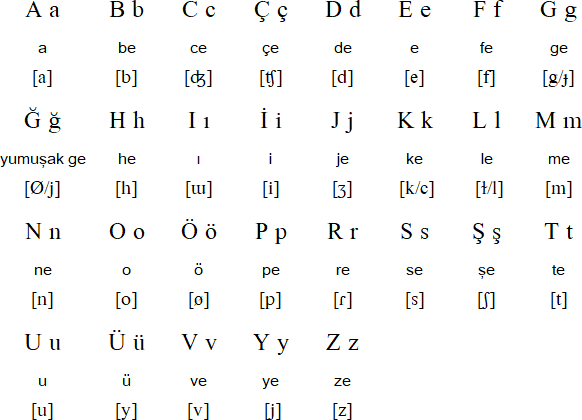Turkish known in Turkey as Türkçe is the most widely spoken and official language of Turkey. Turkish is a Turkic language spoken by about 90 million people worldwide, making it the 18th most spoken language in the world.
A Brief History of the Turkish Language
Turkish originated from Central Asia as the Ottoman Turkish language of the Ottoman Empire. Through the expansion of the Ottoman Empire, Turkish spread to Southeastern Europe, the Caucasus, the Middle East, and North Africa After the fall of the Ottoman Empire and the founding of the Republic of Turkey, the Turkish Language Association initiated reforms to replace loanwords of Arabic and Persian origin with Turkish equivalents. The modern Turkish alphabet using Latin script was established in 1928 to replace the Perso-Arabic Ottoman script
Classification of Turkish
Turkish is part of the Oghuz branch of the Turkic language family. Linguistically, it is most closely related to other Oghuz languages like Azerbaijani, Turkmen, Qashqai, and Gagauz. Historically, Turkish was considered to be part of the Altaic language family along with Mongolian, Manchu, and Korean but this classification is now considered doubtful by most linguists.
Distinctive Features of Turkish
Some key features that distinguish Turkish from other languages include:
- Vowel harmony – words only contain vowels from one class such as front or back vowels
- Agglutination – longer words are formed by adding suffixes to word roots
- SOV word order – basic sentence structure follows subject-object-verb order
- No grammatical gender – nouns do not have gender categories like masculine or feminine
- Extensive honorifics – the language has many ways to convey formality, politeness, and social distance
Geographic Distribution
Turkish is natively spoken primarily in Turkey and Northern Cyprus. Turkish-speaking minorities can also be found in many countries that were once part of the Ottoman Empire such as Iraq, Bulgaria, Greece, North Macedonia, Romania, and the Balkans. Significant Turkish-speaking immigrant communities exist in Germany, France, the Netherlands, Austria, and other Western European countries.
Official Status
Turkish has official status in Turkey and Northern Cyprus. It is also officially recognized as a minority language in Iraq, North Macedonia, Greece, Romania, Kosovo, and Bosnia. Turkish is among the languages with most official status in Europe.
Dialects
There are various dialects of Turkish based on regional differences across Turkey and neighboring Turkic countries. Major dialects include Istanbul Turkish, Rumelian Turkish, Meskhetian Turkish, Azerbaijani Turkish, Gagauz Turkish, and Balkan Turkish dialects like Cypriot Turkish. The standard dialect is based on Istanbul Turkish.
Basic Grammar and Features
Some key elements of Turkish grammar and vocabulary:
- Agglutinative – words are formed by stringing suffixes to root words
- Subject-Object-Verb order – sentence structure has the subject first, then object, then verb
- Vowel harmony – words can only have front or back vowels
- No grammatical gender – no masculine or feminine noun categories
- No articles – no definite or indefinite articles like ‘the’ or ‘a’
- Frequent honorifics – extensive use of politeness markers and pronouns

TURKISH – A Language Profile | (TÜRKÇE)
FAQ
What language is mainly spoken in Turkey?
Is Turkey an Arab language?
What language is Turkish closest to?
Do the speak English in Turkey?
